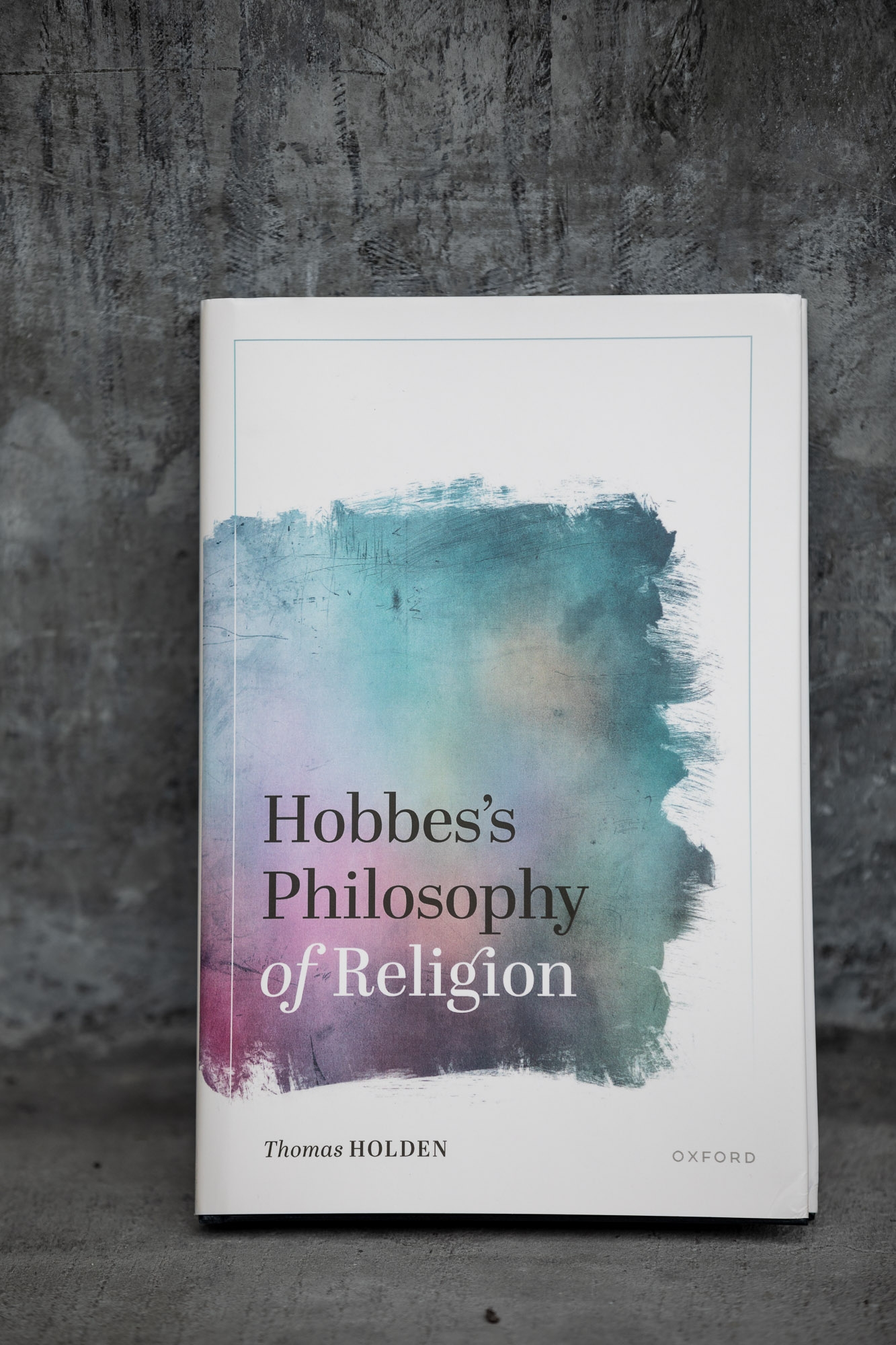
When it comes to 17th-century English philosophers, Thomas Hobbes holds a lot of appeal. He wrote with vivid prose, rich argument and a stinging wit. He was also ahead of his time.
Nearly 400 years ago, just as the scientific revolution was gathering pace, Hobbes advanced “a strikingly modern view of human beings as entirely a part of nature, not a clipped-wing demigod somehow set apart,” said Thomas Holden, a UC Santa Barbara philosophy professor with a new book on Hobbes.

While Hobbes’ writings are best known as the building blocks of modern political philosophy, it’s his contemplations on religion and God — identified as the underlying “incomprehensible great cause of all” — that have long stirred controversy. This is where Holden’s “Hobbes’s Philosophy of Religion” (Oxford University Press, 2023) presents a new scholarly interpretation of Hobbes’ treatment of religious speech and practice.
“I first came to see the importance of Hobbes’ radical transvaluation of religious language in an ‘aha’ moment while teaching an advanced course on Hobbes here at UCSB,” said Holden, who serves as the vice chair and director of undergraduate studies in the philosophy department.
“Those courses can be great venues to try out interpretive hypotheses, stress-testing them with students who are reading the same texts closely and won't let you get away with any nonsense," he added. On this occasion, the more one looked at the texts, the more evidence there was. Everything clicked into place.”
Ahead of the book’s May release in the U.S., The Current caught up with Holden for background on his subject matter and his approach to the project.
The Current: What are the rival interpretations of Hobbes’ writings about religion?
Thomas Holden: Hobbes often affirms traditional theistic, Christian and Protestant doctrines. But he also seems willing to twist the interpretation of scripture to his own political and materialist-scientific purposes. So you might take him to be a sincere and literal-minded Christian straining to reconcile scripture with his own political philosophy and 17-century physics. Or alternatively, you might view him as a covertly irreligious thinker, writing in an age of religious persecution, who disguises his real views with pious smoke and mirrors. It would depend on how suspicious-minded you are. Each reading has had its champions down the generations to today, and each interpretive camp can avail itself of textual evidence that might seem to point in its direction. So one can see where each of these traditional rival interpretations is coming from.
And what’s your take on these interpretive camps?
As I see it, both of the traditional lines of interpretation are misguided. Each side has failed to properly appreciate his radical treatment of religious speech and practice, which has it that we ought to honor the incomprehensible great cause behind nature by speaking of it in purely honorific terms, and performing our reverence in a publicly intelligible manner. This involves acting in conformity with the locally accepted religious traditions, ceremonies and rituals, whatever they may be — Protestant, Catholic, Islamic, etc.
Hobbes holds that this honor-giving outward display is rational and pious, and in that sense he is genuinely religious. But scholars have not properly appreciated the exclusively honorific function of all this pious speech and ceremonial practice, and the fact that none of it amounts to a literal-minded description of anything. The one group of traditional interpreters has seized upon his outward Christian conformity, the other upon the sense of mercurial double-talk and the air of detachment from doctrinal specifics in Hobbes's theology. But both sides have simply missed his radical de-literalization of all religious language.
How did you go about it?
I approach his overall treatment of religion through his account of religious language, using it as a key to unlock what he has to say. According to Hobbes, our religious utterances do not really describe some hidden reality or affirm truths in any literal minded way, but are only meant to honor — not describe — the incomprehensible great cause behind nature. That account of religious language applies equally to Hobbes’ own utterances as much as anyone else’s, and so we have to interpret everything he says about God’s attributes and actions, sacred history and so on, as merely honorific, not literal-minded or descriptive.
Once one applies Hobbes’ own explicit account of how religious language works reflexively to his own statements, we can see that he is entirely consistent and indeed relentlessly systematic throughout. He is remarkably forthright about all of this.
Of course, literal-minded theists may not be too happy about his complete de-literalization of religious discourse – and some of his sharper contemporaries who did understand what he was proposing did not like it very much!
For those familiar with Hobbes, including your contemporary scholars, what do you hope this book brings to the discussion?
I highlight his radical treatment of religious language, both as the code to understanding his own overall discussion of religious topics and as his most significant contribution to the philosophy of religion. Understanding Hobbes’ purely honorific approach to religious language helps us to explain why so many scholars have found either the atheistic or the literal-minded theistic reading attractive. In this way, I aim not merely to advance a new understanding of his philosophy of religion, but to reframe the traditional theistic/atheistic terms of the debate.
For those unacquainted with Hobbes, is this book approachable?
The book should be approachable by anyone with a serious interest in Hobbes, the philosophy of religion, early modern philosophy or early modern intellectual history. It gets pretty fine-grained in examining certain texts, though I also offer the reader who desires a shortcut a survey view of what is going on. The book engages in scholarly controversy, though it is also intended to be accessible to advanced undergraduates and the educated layperson.

Thomas Holden
Professor Thomas Holden specializes in modern philosophy. His research work is in the history of 17th- and 18th-century philosophy, focusing largely on metaphysics, philosophy of science, philosophy of language, and philosophy of religion of the empiricist tradition. Before "Hobbes's Philosophy of Religion" (2023), he wrote "Spectres of False Divinity: Hume’s Moral Atheism" (2010) and "The Architecture of Matter: Galileo to Kant" (2004), all published by Oxford University Press.
Keith Hamm
Social Sciences, Humanities & Fine Arts Writer
(805) 893-3207
keithhamm@ucsb.edu



